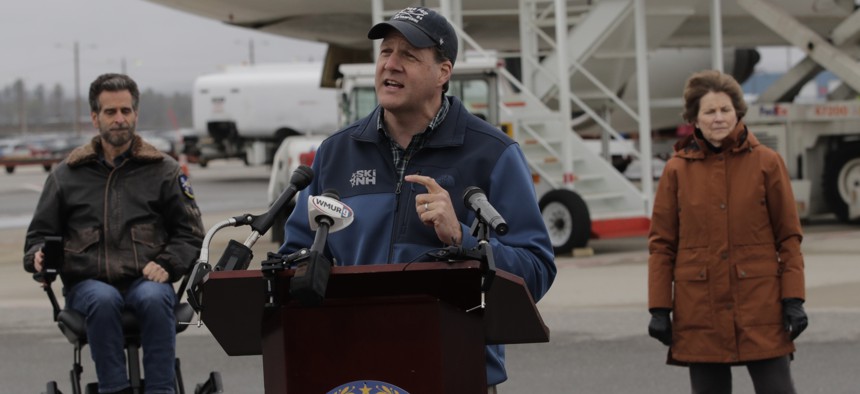New Hampshire to Sue Massachusetts Over Income Tax Policy

N.H. Gov. Chris Sununu gestures during a news conference. AP Photo
STATE AND LOCAL ROUNDUP | Michigan governor accuses President Trump of inciting terrorism … Trump administration reverses stance on California wildfire relief … Wisconsin to deploy National Guard as poll workers.
The state of New Hampshire plans to sue Massachusetts over its plan to continue collecting state income taxes from people who live in New Hampshire but work for companies based in Massachusetts, even if they are now working from home in New Hampshire due to the pandemic. Before the pandemic, New Hampshire residents who worked for Massachusetts companies only paid income taxes for the days they worked in the state. The new tax rule has faced significant opposition from New Hampshire residents and politicians who say that continuing to collect Massachusetts income taxes while people work from home in another state is unconstitutional. In August, New Hampshire Attorney General Gordon MacDonald wrote that the rule "infringes upon the state of New Hampshire's fundamental interests as a sovereign." In the same month, New Hampshire Gov. Chris Sununu wrote to Massachusetts Gov. Charlie Baker saying that he had “serious policy and legal concerns with Granite Staters being taxed in Massachusetts when they have not crossed the state line in months due to the Covid-19 pandemic” and said that it was his hope that “this matter can be resolved promptly” to forgo “legal remedies.” On Friday, Sununu wrote on Twitter that Massachusetts was “attempting to pick the pockets” of New Hampshire residents and that New Hampshire would file a lawsuit and “fight this unconstitutional attempt to tax our citizens.” The Massachusetts revenue department has defended its tax policy as permissible during the state of emergency Baker declare din March. “The Commonwealth has implemented temporary regulations that are similar to those adopted by other New England states," said Naysa Woomer, an agency spokeswoman. [Eagle Tribune; NHPR; Boston Globe]
MICHIGAN GOVERNOR | Michigan Gov. Gretchen Whitmer clashed with President Trump over the weekend, with the governor accusing the president of inciting “domestic terrorism” against her just days after federal agents arrested people who allegedly sought to kidnap and execute the governor. On Saturday at a rally in the state, Trump criticized the governor’s Covid regulations, prompting the crowd to chant “lock her up.” The president then said, "I guess they say she was threatened." For their part, the Trump campaign complained about an emblem that Whitmer had on a table during an interview with “Meet the Press” that said, "8645,” using a restaurant term, 86, to suggest getting rid of the 45th president. "Whitmer is encouraging assassination attempts against President Trump just weeks after someone sent a Ricin-laced package to the White House," his campaign said on Twitter. [Detroit News; Detroit Free Press]
WILDFIRE RELIEF | The Trump administration on Friday reversed itself on an initial rejection of California’s request for federal disaster aid. The state requested funds to aid in recovery efforts following hundreds of fires that raged across the state in the past few months, burning more than 1.8 million acres and destroying thousands of buildings and homes. The state specifically needs help with recovery from six major fires, including the Creek Fire, which is still ongoing and one of the largest fires in state history. Gov. Gavin Newsom said he spoke with President Trump on Friday and he immediately promised FEMA’s initial determination would be overturned. In his request for aid, Newsom said that the pandemic recession has led to a projected $54.3 billion deficit in the state budget. “California’s economy is suffering in a way we have not seen since the 2009 Great Recession,” he said. [Los Angeles Times; New York Times]
DHS LAWSUIT | Portland and Oakland filed a lawsuit against the U.S. Department of Homeland Security and the Justice Department, arguing that it was unconstitutional to send federal law enforcement officers to quell protests in the cities this summer. The suit says that federal officers were deployed “either secretly or with little warning" to Portland and had “virtually limitless jurisdiction” while they were there. “Long-established principles of federalism, paired with congressional limitations, restrict the ability of the federal government to unilaterally deploy domestic military or police interventions,” the suit reads. It continues to call the deployments “politically motivated interventions” and a threat to “American cities run by Democrats.” Homeland Security spokesperson Matt Boggs, called the lawsuit “meritless” and said the cities were “aim[ing] to harm President Trump and distract from his law and order agenda.” [The Oregonian; KOIN]
POLL WORKERS | Fifty-one communities in Wisconsin are facing a severe shortage of poll workers, but Gov. Tony Evers said that he has a solution if local governments aren’t able to recruit more people by election day. "The National Guard will be there to make sure we have enough people working at the polls," Evers said. It is not clear how many National Guard soldiers would be deployed to each community. In total, only about 180 more poll workers are needed in the state, with most communities only needing five or fewer. But that can pose a challenge in rural areas where polls are staffed by only a few people. Meagan Wolfe, the director of the state Elections Commission, said that the problem is significant, but that the state is “in a much better spot than we have ever been this year.” [Milwaukee Journal Sentinel]
Managing editor Laura Maggi contributed to this report.
Emma Coleman is an assistant editor at Route Fifty.
NEXT STORY: Marijuana Companies Seek Disaster Relief






